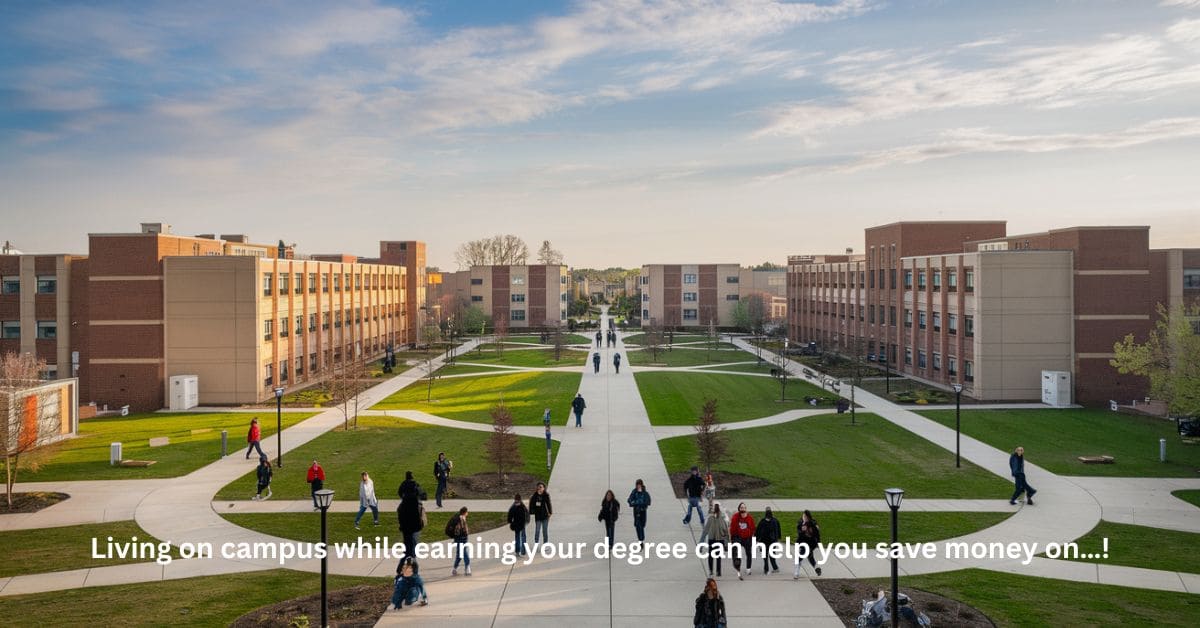Living on campus while earning your degree can help you save money on rent, utilities, transportation, and meal plans, significantly reducing college costs and simplifying budgeting.
This article explores how living on campus while earning your degree can help you save money on critical expenses, providing insights and analysis that highlight both short-term savings and long-term benefits.
Why Living on Campus Can Be a Smart Financial Move – Make The Informed Decision!
The financial strain associated with college can be overwhelming. Rent, utilities, groceries, and transportation can add up quickly for off-campus students, often pushing budgets to the limit. On-campus housing offers a bundled solution that combines students’ essential needs into one fixed price. By understanding how living on campus while earning your degree can help you save money on various aspects, students and families can make more informed choices that maximise value and convenience.
How Living on Campus Saves Money on Rent and Utilities – The Ways Explored!
Bundled Rent Costs:
On-campus housing typically offers a more predictable cost structure. Off-campus students face fluctuating rent prices depending on the market, while campus housing remains consistent throughout the academic year. This stability allows students to better plan their finances, knowing that housing costs will not change unexpectedly.
Inclusive Utilities:
Most on-campus housing packages include essential utilities like electricity, water, heating, and internet. For students living off campus, these utilities are often separate expenses that add significantly to the cost of living. By eliminating these extra costs, students can focus more on their academics and less on managing bills.
Potential Savings Comparison:
On average, students who live on campus can save hundreds of dollars per month by avoiding market-rate rental prices. Over a four-year degree, these savings can add up to thousands of dollars, allowing students to reallocate funds towards tuition or personal expenses.
Transportation Savings – Reducing Costs and Travel Time!
Living close to classes, libraries, and other campus facilities saves students significantly on transportation costs. Off-campus students often need to drive or use public transit, adding fees for fuel, parking permits, and transportation passes.
Reduced Need for a Car:
Owning a car on campus comes with additional expenses, including insurance, maintenance, and parking fees. By living on campus, students can eliminate the need for a car, cut down on related costs, and simplify their daily routine.
Health Benefits of Walking and Biking:
Beyond financial savings, students who live on campus benefit from walking or biking to class. These activities promote a healthy lifestyle and eliminate the need for a gym membership or other fitness-related expenses, as students remain active just by navigating campus.
The Financial Benefits of Meal Plans and On-Campus Dining – Make A Schedule!
Meal plans are another factor that can make on-campus living cost-effective. Meal plans often provide various food options at predictable prices, allowing students to save on groceries and dining out.
Structured Dining Options:
Campus dining facilities offer a range of meal plan options to suit different budgets and dietary preferences. These plans are usually more affordable than purchasing individual meals or groceries, especially for students who need more cooking facilities or experience.
Lower Food Waste and Better Nutrition:
Pre-paid meal plans make students less likely to waste food or overspend on dining out. Additionally, on-campus dining services often provide balanced, nutritious meals designed with students’ dietary needs in mind, promoting a healthier lifestyle without the added cost of premium groceries.
Additional Savings on Amenities and Campus Resources – Save More!
On-campus housing often includes access to amenities such as gyms, recreational facilities, study spaces, and social events at no extra cost. These resources are valuable not only for financial savings but also for enhancing the college experience.
Access to Free or Low-Cost Campus Events:
Many universities offer a range of free events, workshops, and social activities. Living on campus allows students to take full advantage of these offerings, providing entertainment and learning opportunities without extra spending.
Cost Savings on Campus Facilities:
Many campuses provide free or discounted services like counselling, medical clinics, and tutoring centres. Students living on campus can access these services conveniently, lowering out-of-pocket expenses.
Increased Opportunities for Scholarships and Financial Aid – Be The Brilliant!
Some institutions offer additional financial aid or scholarships specifically for students who choose to live on campus. These incentives can include discounts on housing costs, meal plan subsidies, or grants that offset other expenses.
Enhanced Access to Financial Resources:
Living on campus often connects students with more resources through the university’s financial aid office. These resources can help reduce student debt and provide extra funds for books, supplies, and other necessities.
Simplifying Budgeting and Financial Planning for Students!
On-campus living streamlines expenses into one manageable payment, helping students manage their finances more effectively. By bundling housing, utilities, and meal plans together, students can track their spending and avoid unexpected costs more easily.
Many students find that simplified budgeting reduces stress, allowing them to focus more on their studies. Knowing that most of their living expenses are covered by one payment gives students peace of mind and minimises the risk of financial mismanagement.
Personal and Academic Benefits of On-Campus Living – Explore Now!
Building a Support Network:
On-campus housing facilitates a close-knit community that fosters friendships and support networks. This environment can be especially beneficial for freshmen or international students adjusting to a new environment.
Increased Academic Focus and Performance:
Students on campus have more access to academic resources like libraries, study centres, and faculty offices. These students may be better positioned to succeed academically with fewer distractions and shorter commute times.
Long-Term Financial Implications of On-Campus Living – Plan Broad!
Choosing to live on campus offers immediate savings and contributes to long-term financial benefits. Students can leave college with a better economic outlook by minimising debt and reducing reliance on loans.
Students who avoid unnecessary costs through on-campus living often graduate with less debt. This reduced financial burden allows them to start careers with a more robust economic foundation, facilitating future savings and investments.
FAQs:
Do all campuses offer discounted housing options?
Some universities provide housing grants or scholarships, but Availability varies. Check with your school’s financial aid office for specific options.
How can I further reduce costs while living on campus?
Take advantage of free campus resources, limit eating out, and participate in campus events instead of costly off-campus activities.
Are there downsides to living on campus?
Some students may find campus life restrictive, but the financial and academic benefits generally outweigh these concerns.
Conclusion:
Living on campus while earning your degree can help you save on essential expenses, making it a financially savvy choice for many students. From rent and utilities to transportation and meal plans, on-campus living offers bundled services that simplify budgeting and allow.






